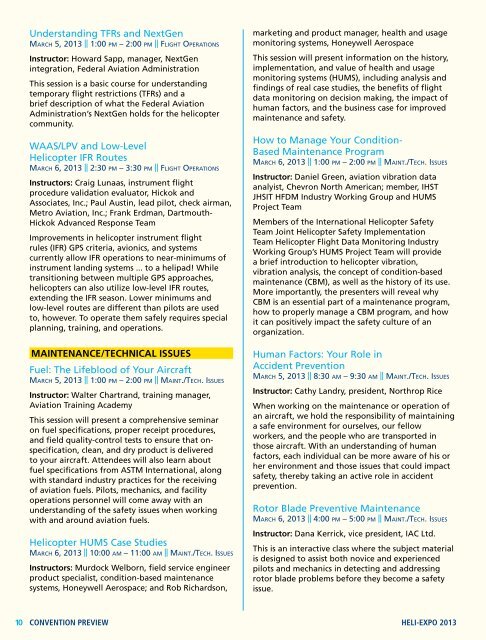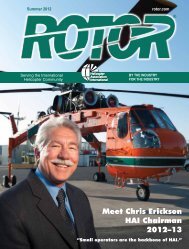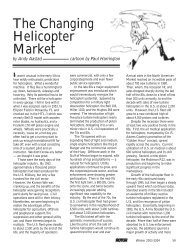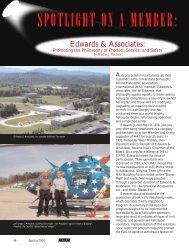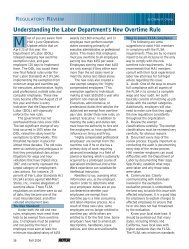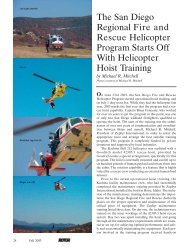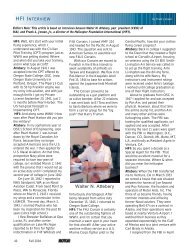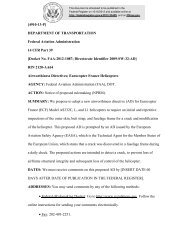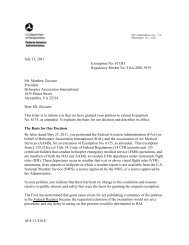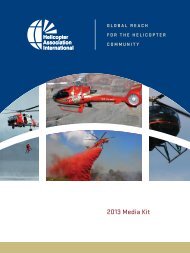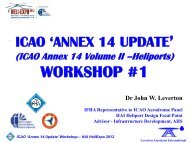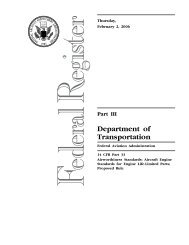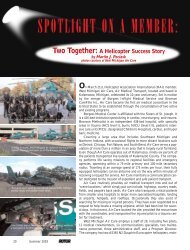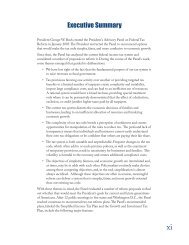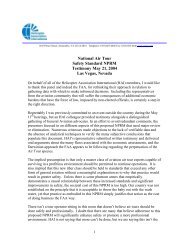Convention Preview (pdf) - Helicopter Association International
Convention Preview (pdf) - Helicopter Association International
Convention Preview (pdf) - Helicopter Association International
You also want an ePaper? Increase the reach of your titles
YUMPU automatically turns print PDFs into web optimized ePapers that Google loves.
Understanding TFRs and NextGen<br />
March 5, 2013 || 1:00 pm – 2:00 pm || Flight Operations<br />
Instructor: Howard Sapp, manager, NextGen<br />
integration, Federal Aviation Administration<br />
This session is a basic course for understanding<br />
temporary flight restrictions (TFRs) and a<br />
brief description of what the Federal Aviation<br />
Administration’s NextGen holds for the helicopter<br />
community.<br />
WAAS/LPV and Low-Level<br />
<strong>Helicopter</strong> IFR Routes<br />
March 6, 2013 || 2:30 pm – 3:30 pm || Flight Operations<br />
Instructors: Craig Lunaas, instrument flight<br />
procedure validation evaluator, Hickok and<br />
Associates, Inc.; Paul Austin, lead pilot, check airman,<br />
Metro Aviation, Inc.; Frank Erdman, Dartmouth-<br />
Hickok Advanced Response Team<br />
Improvements in helicopter instrument flight<br />
rules (IFR) GPS criteria, avionics, and systems<br />
currently allow IFR operations to near-minimums of<br />
instrument landing systems ... to a helipad! While<br />
transitioning between multiple GPS approaches,<br />
helicopters can also utilize low-level IFR routes,<br />
extending the IFR season. Lower minimums and<br />
low-level routes are different than pilots are used<br />
to, however. To operate them safely requires special<br />
planning, training, and operations.<br />
Maintenance/Technical Issues<br />
Fuel: The Lifeblood of Your Aircraft<br />
March 5, 2013 || 1:00 pm – 2:00 pm || Maint./Tech. Issues<br />
Instructor: Walter Chartrand, training manager,<br />
Aviation Training Academy<br />
This session will present a comprehensive seminar<br />
on fuel specifications, proper receipt procedures,<br />
and field quality-control tests to ensure that onspecification,<br />
clean, and dry product is delivered<br />
to your aircraft. Attendees will also learn about<br />
fuel specifications from ASTM <strong>International</strong>, along<br />
with standard industry practices for the receiving<br />
of aviation fuels. Pilots, mechanics, and facility<br />
operations personnel will come away with an<br />
understanding of the safety issues when working<br />
with and around aviation fuels.<br />
<strong>Helicopter</strong> HUMS Case Studies<br />
March 6, 2013 || 10:00 am – 11:00 am || Maint./Tech. Issues<br />
Instructors: Murdock Welborn, field service engineer<br />
product specialist, condition-based maintenance<br />
systems, Honeywell Aerospace; and Rob Richardson,<br />
marketing and product manager, health and usage<br />
monitoring systems, Honeywell Aerospace<br />
This session will present information on the history,<br />
implementation, and value of health and usage<br />
monitoring systems (HUMS), including analysis and<br />
findings of real case studies, the benefits of flight<br />
data monitoring on decision making, the impact of<br />
human factors, and the business case for improved<br />
maintenance and safety.<br />
How to Manage Your Condition-<br />
Based Maintenance Program<br />
March 6, 2013 || 1:00 pm – 2:00 pm || Maint./Tech. Issues<br />
Instructor: Daniel Green, aviation vibration data<br />
analyist, Chevron North American; member, IHST<br />
JHSIT HFDM Industry Working Group and HUMS<br />
Project Team<br />
Members of the <strong>International</strong> <strong>Helicopter</strong> Safety<br />
Team Joint <strong>Helicopter</strong> Safety Implementation<br />
Team <strong>Helicopter</strong> Flight Data Monitoring Industry<br />
Working Group’s HUMS Project Team will provide<br />
a brief introduction to helicopter vibration,<br />
vibration analysis, the concept of condition-based<br />
maintenance (CBM), as well as the history of its use.<br />
More importantly, the presenters will reveal why<br />
CBM is an essential part of a maintenance program,<br />
how to properly manage a CBM program, and how<br />
it can positively impact the safety culture of an<br />
organization.<br />
Human Factors: Your Role in<br />
Accident Prevention<br />
March 5, 2013 || 8:30 am – 9:30 am || Maint./Tech. Issues<br />
Instructor: Cathy Landry, president, Northrop Rice<br />
When working on the maintenance or operation of<br />
an aircraft, we hold the responsibility of maintaining<br />
a safe environment for ourselves, our fellow<br />
workers, and the people who are transported in<br />
those aircraft. With an understanding of human<br />
factors, each individual can be more aware of his or<br />
her environment and those issues that could impact<br />
safety, thereby taking an active role in accident<br />
prevention.<br />
Rotor Blade Preventive Maintenance<br />
March 6, 2013 || 4:00 pm – 5:00 pm || Maint./Tech. Issues<br />
Instructor: Dana Kerrick, vice president, IAC Ltd.<br />
This is an interactive class where the subject material<br />
is designed to assist both novice and experienced<br />
pilots and mechanics in detecting and addressing<br />
rotor blade problems before they become a safety<br />
issue.<br />
10<br />
<strong>Convention</strong> <strong>Preview</strong> HELI-EXPO 2013


